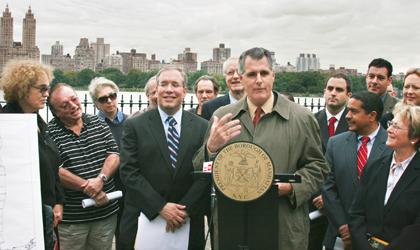By Anna Gustafson
City Councilman James Gennaro (D-Fresh Meadows) said the state’s recent proposal not to ban drilling in the upstate area that provides drinking water for city residents could cost New Yorkers billions of dollars and is urging the public to voice its thoughts on the matter at a public hearing he will hold Oct. 23.
“If drilling is allowed in the watershed, we’d be forced to construct a water filtration plant, which could cost between $10 billion and $20 billion and would cost about a billion dollars a year to operate,” said Gennaro, head of the Council Committee on Environmental Protection. “It would be untold billions of dollars paid by water and sewer ratepayers.”
At the end of September the state Department of Environmental Conservation released its draft environmental impact statement on the natural gas drilling activities in the Marcellus Shale formation, which runs for about 600 miles through New York, Pennsylvania, Ohio and Virginia.
The statement did not ban gas drilling in the 1 million-acre watershed area that provides drinking water for more than 8 million city residents and 1 million people in Westchester and other counties, but it does set rules as to where wells may be drilled and requires gas companies to publicly disclose which chemicals they use while extracting the gas.
“Anything that would allow gas drilling within the confines of New York City’s upstate watershed is unacceptable,” Gennaro said.
Gennaro will hold a hearing on the state’s proposal Oct. 23 at 10 a.m. in City Hall.
Council Speaker Christine Quinn (D-Manhattan) and Councilman Tony Avella (D-Bayside) have also lambasted the state’s decision, which will be publicly reviewed until the end of November.
“We simply cannot afford to jeopardize the health and financial well-being of New Yorkers by allowing the natural gas industry to undertake large-scale developments in the Catskill and Delaware watershed,” Quinn and Gennaro said in a joint statement.
Avella introduced a resolution in the Council the day the state came out with its proposal, calling on the state Legislature, DEC and Gov. David Paterson to prohibit the practice of hydraulic fracturing, a process of extracting natural gas that entails injecting up to 5 million gallons of water laced with chemicals into the ground at high pressure to break the rock. The method has been criticized by officials and environmentalists.
“Numerous toxic spills have happened across the country as a result of this type of natural gas drilling, and I am asking the state to prohibit this dangerous practice in order to preserve our most precious natural resource,” Avella said.
Last summer the U.S. Land Management Bureau documented that groundwater in Sublette County, Wyo., which has one of the country’s largest natural gas fields and where hydraulic fracturing is commonly employed, had been contaminated with benzene, a substance that has been linked to cancer and nervous system disorders.
Reach reporter Anna Gustafson by e-mail at agustafson@cnglocal.com or by phone at 718-229-0300, Ext. 174.



































